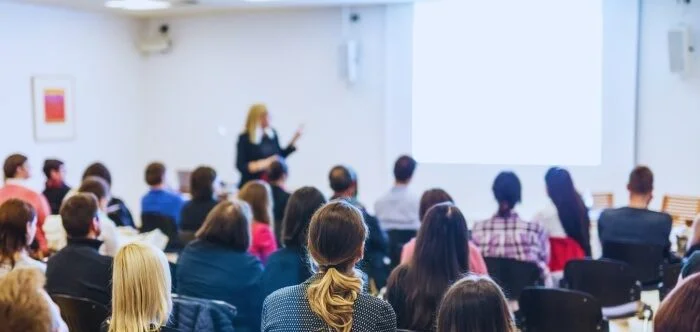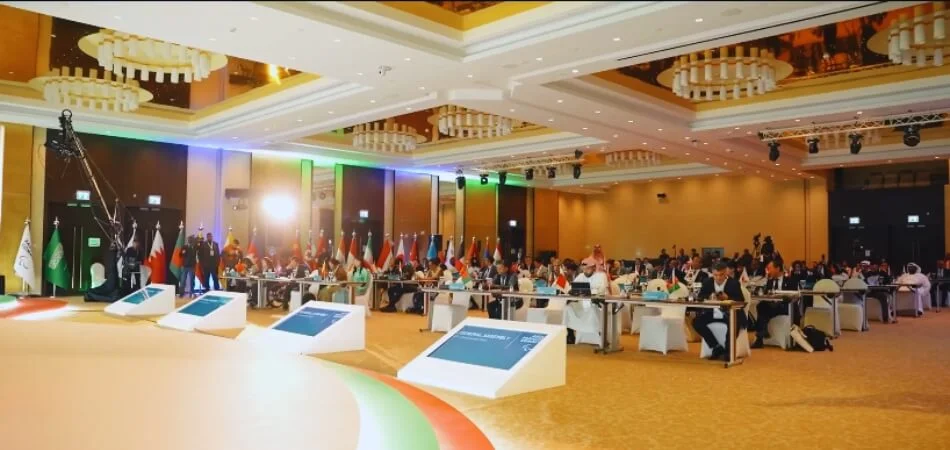Attending a conference is not just about gaining new knowledge and insights; it’s also about sharing these valuable nuggets of wisdom with your wider community. This practice turns individual learning into collective growth. But the question arises, “What do you share after attending a conference?”
After attending a conference, it’s essential to share key insights, networking connections, workshop learnings, and future trends. Discussing these elements helps foster a culture of collaboration within your organization. From keynote speeches, you can distill information, share contacts for potential collaborations, and introduce new strategies to improve team performance.
Are you curious about what information to share with your colleagues? By reading this article, you’ll discover effective ways to disseminate conference learning and ensure your organization benefits from your experience.
What Happens at a Conference?
A conference is a dynamic gathering where professionals and experts converge to exchange ideas, insights, and the latest developments in their field. It’s an invaluable platform for networking, learning, and collaborations. These events often feature a blend of keynote speeches, panel discussions, and workshops.

At well-organized conferences, keynote speeches are like the main act. Big-shot experts talk in-depth about important topics and what’s new. Then comes panel discussions, where people discuss different ideas about relevant topics. Workshops and group sessions happen, too, where you get to try things out and learn skills.
Networking opportunities abound, allowing attendees to connect with peers, mentors, and industry leaders. These interactions often lead to collaborations and best practices sharing. The exchange of business cards and LinkedIn connections is a common sight, as relationships forged here can impact careers and industries significantly.
Why Should You Attend a Conference?
Your career can be transformed by attending a conference. It offers a unique opportunity to expand your professional network, gain insights from industry leaders, and stay updated with the latest trends. Whether you are a seasoned professional or just starting, the benefits of participating are significant.
Networking Opportunities
Conferences are a hub of like-minded professionals, providing a great platform to expand your network. You can meet industry experts, potential collaborators, and future employers. Building these connections can lead to future collaborations, job opportunities, and mentorship. Engaging with the community at a conference can set you apart from others.
Learning from Industry Leaders
At a conference, you get direct access to leaders and innovators in your field. These experts share their knowledge, research findings, and predictions about the future. Attending these sessions allows you to learn from their experiences and apply this knowledge in your work. This demonstrates your commitment to continuous learning and professional development.
Developing Your Knowledge and Skills
Conferences often feature workshops, seminars, and presentations that help attendees deepen their knowledge and acquire new skills. Whether it’s a hands-on workshop or an insightful seminar, you’ll gain practical insights you can immediately apply. Showing a willingness to develop your expertise can be a valuable asset in your career.
Gaining Visibility in Your Industry
Presenting your work or simply engaging actively in discussions can increase your visibility in your industry. This can lead to recognition, invitations to speak at future events, or even job offers. By sending your CV for participating in a conference, you can position yourself as an active participant in your industry, which can lead to further opportunities.
Staying Updated with Industry Trends
The business world is constantly growing, and staying updated with the latest trends is crucial to staying competitive. Conferences provide a concentrated source of information about what’s new and what’s coming next. Being engaged in staying current with industry developments is highly valued by employers.
A conference is more than just an event; it’s an investment in your professional career. Taking a significant step toward career growth, skill development, and industry recognition can boost your career to new heights.
What Do You Share After Attending a Conference?
During a conference, you can gain invaluable insight, which can benefit you and your organization as a whole. Here’s how you can effectively distribute the valuable information you’ve gathered at a conference to foster a culture of learning and collaboration.
Key Takeaways and Insights
Gathered insights from keynotes and panels form the core of what you share post-conference. These often include industry trends, technological advances, and expert opinions. Putting these into concise summaries can inform colleagues about the latest developments. Sharing these takeaways helps your team stay abreast of industry shifts and innovations. It can also spark new ideas and strategies within your organization.
Networking and Connections
Conferences are hubs for networking, leading to connections with industry leaders and peers. Sharing contacts and potential collaboration opportunities can be invaluable for your organization. These connections can open doors to partnerships, mentorships, and shared projects. Discussing the people you meet and their areas of expertise can help identify new opportunities for collaboration and growth.
Workshop Learnings and Skills
Hands-on workshops offer practical skills and techniques. Sharing this knowledge can directly improve your team’s capabilities and efficiency. This could involve new tools, methodologies, or best practices you’ve learned. You boost the productivity and innovation of your team by training your colleagues in these new skills.
Future Trends and Predictions
After attending a conference, share innovative strategies that can be implemented within your organization. This involves adopting new business models or operational processes discussed during the event, ensuring that the knowledge gained translates into actionable steps for improvement.
Increasing Team Morale and Motivation
The enthusiasm gained from attending a conference can significantly boost team morale. By sharing positive experiences and exciting developments, you can reignite your team’s passion for their work, leading to increased productivity and a more motivated work environment.
Knowledge Sharing Sessions
Organizing knowledge-sharing sessions is an effective way to disseminate information gathered at a conference. These sessions can be presentations or informal discussions that encourage collaboration and continuous learning, increasing your team’s collective knowledge and improving decision-making.
Future Trends and Predictions
Conferences often provide perspectives into future trends and predictions. Sharing these can help your organization anticipate and adapt to upcoming changes. This kind of information is crucial for strategic planning and maintaining a competitive edge. By integrating these predictions into your business strategy, you can better prepare for future challenges and opportunities.
Sharing your conference experiences is not just about imparting knowledge; it’s about inspiring and equipping your team for future success. When you share experience after attending a conference, you can turn individual learning into collective growth, ensuring that the entire organization benefits. Remember, the true value of a conference lies not only in what you learn but also in what you share.
What Are the Best Ways to Have a Great Conference Experience?
A conference can offer life-changing opportunities for learning and networking. To maximize these benefits, approach them with a strategic mindset. Here’s how you can have a great experience at any conference you attend.
Effective Planning
Start by setting clear goals for what you want to achieve at the conference. This could include learning specific skills, meeting industry leaders, or gaining insights into new trends. Research the agenda and speakers in advance to prioritize sessions and activities. Planning helps you focus on the most relevant sessions and networking opportunities, ensuring a productive experience.
Active Participation
The conference experience is improved by actively participating in sessions and workshops. Don’t hesitate to ask questions or contribute to discussions. This not only deepens your understanding but also increases your visibility among peers. You can make the most of your time by participating actively and creating meaningful interactions.
Networking Strategies
Make connections at conferences. Prepare an elevator pitch about your work and interests, and exchange contact information. Meet people informally at networking events or social gatherings. Build meaningful relationships that can lead to future collaborations. Quality connections are more valuable than quantity.
Post-Conference Follow-Up
You can maximize the conference’s impact on your professional growth by following up with the connections you’ve made. Send emails or LinkedIn messages to continue conversations or develop collaborative projects. Taking notes during a conference is essential for retaining valuable insights. You’ll strengthen your connections by sharing these notes. By following up, the benefits of the conference go far beyond the event.
It takes purposeful planning, active engagement, strategic networking, and careful follow-up to ensure a great conference experience. It’s possible to maximize the value of any conference if you use these strategies. A conference’s success isn’t just about what you learn, but about the connections and opportunities you create as well.
Tips to Find the Right Conference For You to Attend
Choosing the right conference is crucial for ensuring a valuable and rewarding experience. It’s about finding a balance between your professional interests and conference opportunities. Here are some tips to guide you in selecting the most suitable conference for your needs.
- Identify your goals for attending a conference, whether it’s for learning, networking, or presenting. Look for conferences that align with these objectives to ensure a beneficial experience.
- Research the conference’s reputation and history to gauge its credibility and the quality of content it offers. Well-established conferences with a good track record are more likely to provide valuable insights and connections.
- Examine the list of speakers and topics to ensure they match your professional interests and areas of expertise. Conferences featuring renowned experts and relevant themes can offer more in-depth knowledge and learning opportunities.
- Consider the conference’s location and size. Smaller, local conferences can offer more intimate networking opportunities, while larger, international events may provide broader perspectives.
- Look at the conference’s networking opportunities, like workshops, panel discussions, or social events. These are crucial for building connections and learning from peers in a more interactive setting.
- Check the feedback and reviews from past attendees to get a sense of the conference’s impact and value. Attendee reviews can provide real insights into the conference’s benefits and shortcomings.
A good conference requires thorough research, a clear understanding of your goals, and consideration of logistical concerns. This guide will help you choose a conference that meets your professional needs as well as your enjoyment. The right conference can serve as a significant stepping stone in your career.
Frequently Asked Questions
After attending a conference, it’s crucial to share what you’ve learned with your colleagues and peers. It is not only a great way to reinforce your own knowledge, but also to create a culture of continuous learning in your organization. Here are some common questions.
What Types of Insights Should Be Shared?
Sharing insights from keynotes, panel discussions, and workshops is essential. Focus on highlighting industry trends, technological advancements, and expert opinions that you find particularly enlightening. By condensing this information into concise summaries, you can help your team stay informed about the latest developments and spark innovative ideas.
How Can I Share My Networking Experiences?
Discussing your networking experiences can provide valuable context to your learnings. Share the connections you made and the potential collaborations that could arise from them. Highlighting these relationships can help your team recognize the importance of networking and encourage them to seek similar opportunities in the future.
What Role Do Practical Skills Play in Sharing?
During workshops, practical skills should be the focus of your sharing efforts. Explain the new tools, methodologies, or best practices you encountered and how they can enhance your team’s efficiency. Offering to train colleagues on these skills can significantly contribute to your organization’s collective growth and adaptability.
How Do I Discuss Future Trends and Predictions?
Incorporating future trends and predictions into your discussions is crucial for strategic planning. Share any insights gained regarding upcoming changes in your industry. This proactive approach will not only help your organization prepare for future challenges but also position you as a thought leader within your team.
What Are the Best Ways to Encourage Knowledge Sharing?
To create a culture of knowledge sharing, create informal sessions or meetings where you can present your findings. Encourage open discussions where team members can ask questions and share their thoughts. By promoting an inclusive environment for knowledge exchange, you ensure that everyone benefits from your conference experience
End Notes
A conference can be a valuable resource for learning, networking, and increasing your professional network. Sharing insights and experiences is essential for creating a collaborative environment within your organization. So, when considering what do you share after attending a conference? Make sure your team understands key takeaways, networking contacts, workshop skills, and future trends.
Remember to plan effectively, participate actively, and follow up diligently to make the most of your conference experience. Look for conferences that align with your goals, and prioritize those that feature industry leaders and relevant topics. Best wishes as you explore your next conference adventure, and may you find it rewarding.







